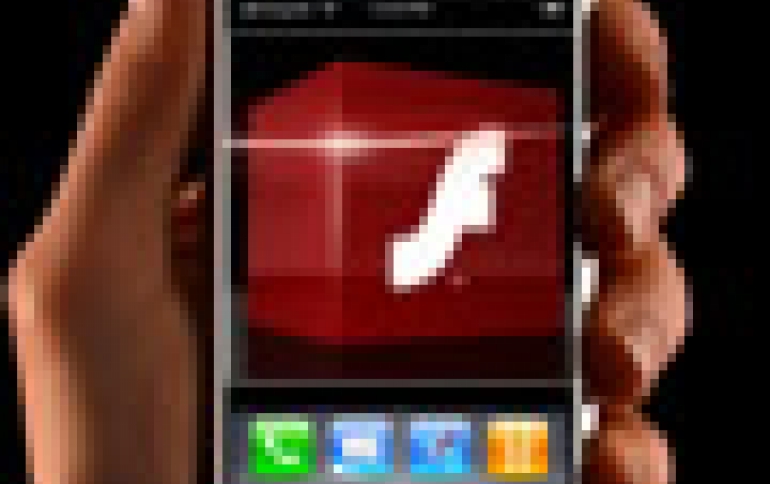
Adobe's CEO Responds To Jobs' Essay
Adobe's CEO Alan Murray commented on Steve Job's open letter regarding Apple's support for Adobe's flash technology.
Earlier on Thursday, Apple CEO Steve Jobs published an essay in which he took Adobe to task over its Flash software, which Apple does not support on its mobile products, such as the iPhone and iPad.
Adobe executives angered in particular by Apple?s decision to block Adobe software that would allow developers to produce programs in Flash that would then be converted to work on the iPhone.
In a Thursday interview with The Wall Street Journal, Adobe CEO Shantanu Narayen described Mr. Jobs's missive an "extraordinary attack," asking what Adobe has done to deserve this.
He says that the difference is that Adobe believes in open content. He says that their Creative Suite software was designed to work on multiple devices and that Apple's "recent behavior shows that they are concerned about Adobe being able" to provide this product that works across multiple platforms.
He talks about Adobe "certainly" shipping on Android's latest version. He says that it is an "incredibly productive time" for Adobe and discusses Creative Suite 5, saying that Adobe's "innovation is blowing people away."
The technology problems that Mr. Jobs mentions in his essay are "really a smokescreen," Mr. Narayen says. He says more than 100 applications that used Adobe's software were accepted in the App Store. "When you resort to licensing language" to restrict this sort of development, he says, it has "nothing to do with technology."
Speaking about Mr. Jobs's assertion that Adobe is the No. 1 cause of Mac crashes, Mr. Narayen says if Adobe crashes Apple, that actually has something "to do with the Apple operating system."
Mr. Narayen also calls accusations about Flash draining battery power "patently false." Speaking about Mr. Jobs's letter in general, he says that "for every one of these accusations made there is proprietary lock-in" that prevents Adobe from innovating.
Mr. Narayen says Adobe's concept is best for most businesses that are developing applications and allows them to send their apps out to many places rather than forcing them to decide on just one. "It doesn't benefit Apple, and that's why you see this reaction," he says.
Responding to a question about Mr. Jobs's assertion that Adobe is a closed platform, Mr. Narayen chuckles. "I find it amusing, honestly. Flash is an open specification," he says.
Mr. Narayen concludes saying he's for "letting customers decide," but that the multi-platform world will "eventually prevail."
Microsoft also believes that the flash technology has flaws.
"Flash does have some issues, particularly around reliability, security and performance," said Dean Hachamovitch, general manager for the Internet Explorer browser.
He said that Microsoft is backing the same protocols for delivering multimedia content over the Web that Apple is promoting, a group of standards known as HTML5.
However, Microsoft added that it worked with Flash engineers to help fix bugs.
Adobe executives angered in particular by Apple?s decision to block Adobe software that would allow developers to produce programs in Flash that would then be converted to work on the iPhone.
In a Thursday interview with The Wall Street Journal, Adobe CEO Shantanu Narayen described Mr. Jobs's missive an "extraordinary attack," asking what Adobe has done to deserve this.
He says that the difference is that Adobe believes in open content. He says that their Creative Suite software was designed to work on multiple devices and that Apple's "recent behavior shows that they are concerned about Adobe being able" to provide this product that works across multiple platforms.
He talks about Adobe "certainly" shipping on Android's latest version. He says that it is an "incredibly productive time" for Adobe and discusses Creative Suite 5, saying that Adobe's "innovation is blowing people away."
The technology problems that Mr. Jobs mentions in his essay are "really a smokescreen," Mr. Narayen says. He says more than 100 applications that used Adobe's software were accepted in the App Store. "When you resort to licensing language" to restrict this sort of development, he says, it has "nothing to do with technology."
Speaking about Mr. Jobs's assertion that Adobe is the No. 1 cause of Mac crashes, Mr. Narayen says if Adobe crashes Apple, that actually has something "to do with the Apple operating system."
Mr. Narayen also calls accusations about Flash draining battery power "patently false." Speaking about Mr. Jobs's letter in general, he says that "for every one of these accusations made there is proprietary lock-in" that prevents Adobe from innovating.
Mr. Narayen says Adobe's concept is best for most businesses that are developing applications and allows them to send their apps out to many places rather than forcing them to decide on just one. "It doesn't benefit Apple, and that's why you see this reaction," he says.
Responding to a question about Mr. Jobs's assertion that Adobe is a closed platform, Mr. Narayen chuckles. "I find it amusing, honestly. Flash is an open specification," he says.
Mr. Narayen concludes saying he's for "letting customers decide," but that the multi-platform world will "eventually prevail."
Microsoft also believes that the flash technology has flaws.
"Flash does have some issues, particularly around reliability, security and performance," said Dean Hachamovitch, general manager for the Internet Explorer browser.
He said that Microsoft is backing the same protocols for delivering multimedia content over the Web that Apple is promoting, a group of standards known as HTML5.
However, Microsoft added that it worked with Flash engineers to help fix bugs.





















